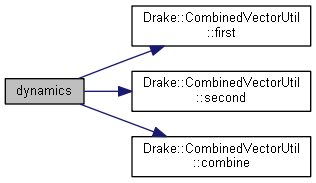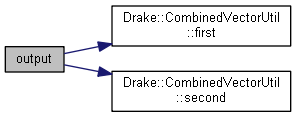|
Drake
|
|
Drake
|
CascadeSystem<System1,System2> More...
#include <drake/systems/cascade_system.h>
Public Types | |
| template<typename ScalarType > | |
| using | StateVector1 = typename System1::template StateVector< ScalarType > |
| template<typename ScalarType > | |
| using | StateVector2 = typename System2::template StateVector< ScalarType > |
| using | util = CombinedVectorUtil< StateVector1, StateVector2 > |
| template<typename ScalarType > | |
| using | StateVector = typename util::template type< ScalarType > |
| template<typename ScalarType > | |
| using | InputVector = typename System1::template InputVector< ScalarType > |
| template<typename ScalarType > | |
| using | System1OutputVector = typename System1::template OutputVector< ScalarType > |
| template<typename ScalarType > | |
| using | OutputVector = typename System2::template OutputVector< ScalarType > |
| using | System1Ptr = std::shared_ptr< System1 > |
| using | System2Ptr = std::shared_ptr< System2 > |
Public Member Functions | |
| CascadeSystem (const System1Ptr &_sys1, const System2Ptr &_sys2) | |
| template<typename ScalarType > | |
| StateVector< ScalarType > | dynamics (const ScalarType &t, const StateVector< ScalarType > &x, const InputVector< ScalarType > &u) const |
| template<typename ScalarType > | |
| OutputVector< ScalarType > | output (const ScalarType &t, const StateVector< ScalarType > &x, const InputVector< ScalarType > &u) const |
| bool | isTimeVarying () const |
| bool | isDirectFeedthrough () const |
| size_t | getNumStates () const |
| size_t | getNumInputs () const |
| size_t | getNumOutputs () const |
| const System1Ptr & | getSys1 () const |
| const System2Ptr & | getSys2 () const |
Friends | |
| StateVector< double > | getInitialState (const CascadeSystem< System1, System2 > &sys) |
CascadeSystem<System1,System2>
Builds a new system from the cascade connection of two simpler systems
| using InputVector = typename System1::template InputVector<ScalarType> |
| using OutputVector = typename System2::template OutputVector<ScalarType> |
| using StateVector = typename util::template type<ScalarType> |
| using StateVector1 = typename System1::template StateVector<ScalarType> |
| using StateVector2 = typename System2::template StateVector<ScalarType> |
| using System1OutputVector = typename System1::template OutputVector<ScalarType> |
| using System1Ptr = std::shared_ptr<System1> |
| using System2Ptr = std::shared_ptr<System2> |
| using util = CombinedVectorUtil<StateVector1, StateVector2> |
|
inline |
|
inline |

|
inline |

|
inline |

|
inline |

|
inline |
|
inline |
|
inline |
|
inline |
|
inline |

|
friend |